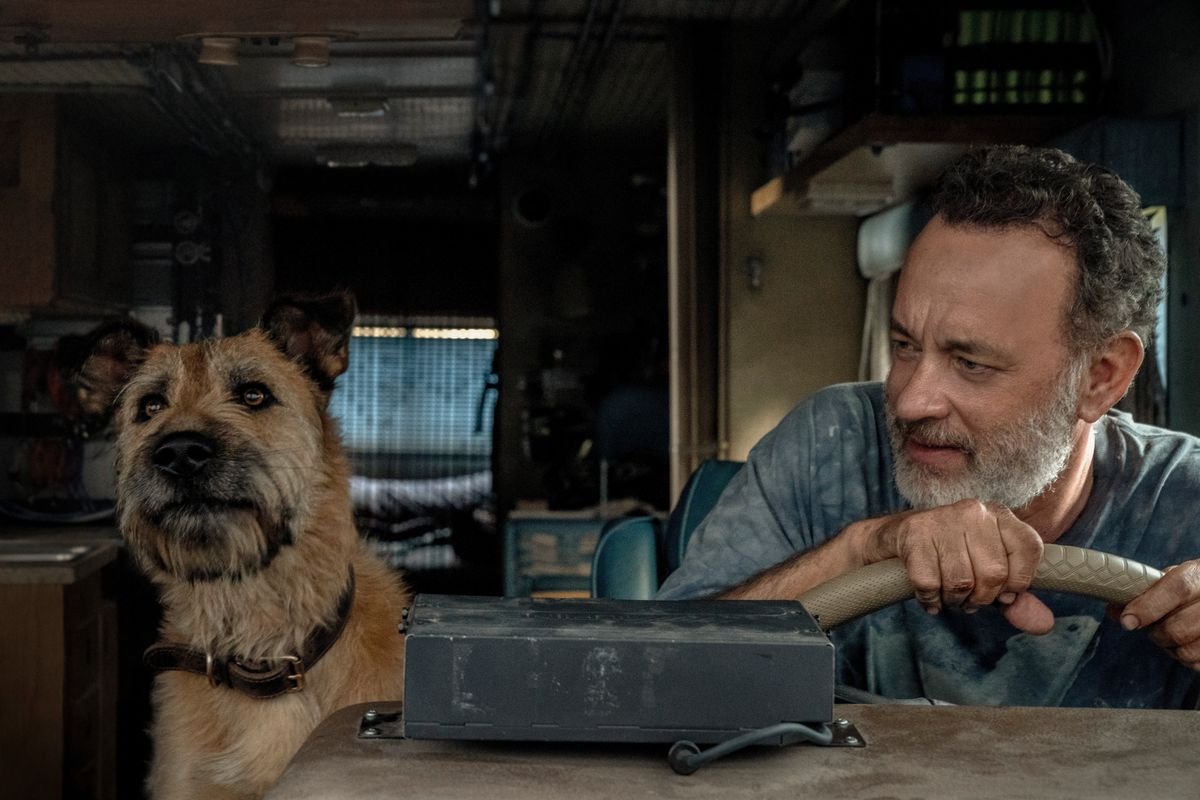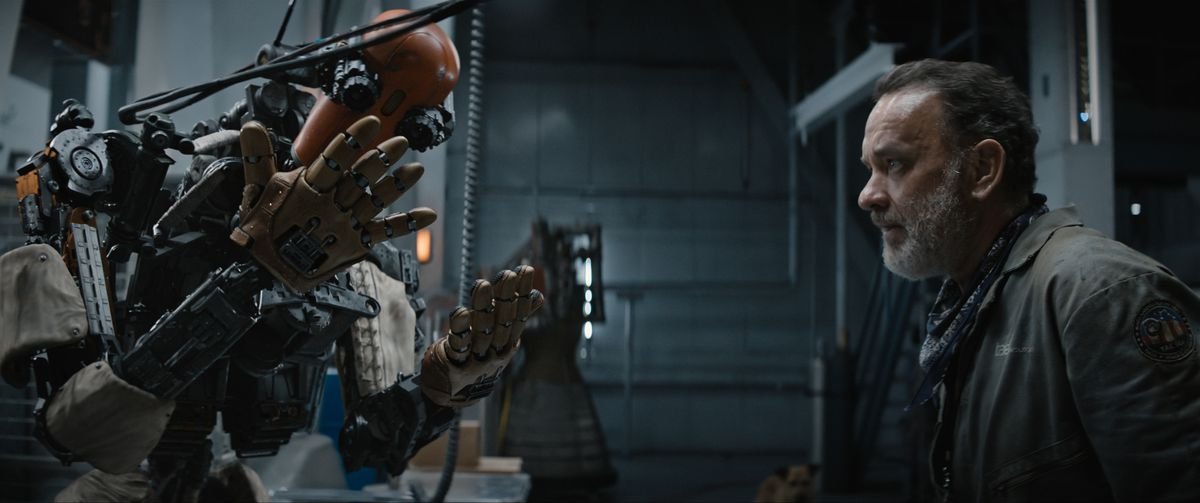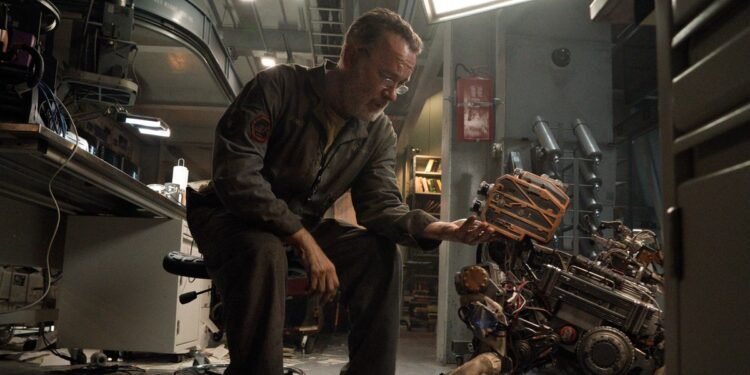Tom Hanks’ career is dotted with American Everyman characters he’s transformed into iconic, fantastical figures by presenting them in naturalistic and humane ways. The teenager living out his dream adult life in Big, a dying man willing to throw himself into a volcano in Joe Versus the Volcano, the man with a million lives in Forrest Gump, the classic American cowboy in the Toy Story franchise, a gangster in Road to Perdition, an FBI agent in Catch Me If You Can, famed newspaperman Ben Bradlee in The Post. They all have something in common, as ordinary people played in extraordinary ways. Few actors exist the way Hanks does, in that space between “instantly recognizable” and “consistently malleable.” His new sci-fi movie Finch is both strengthened and hampered by that duality.
A tonally bizarre film that’s half motion-capture Pinocchio story, half live-action adaptation of Futurama’s infamously melancholy “Jurassic Bark” episode, Finch relies on Hanks’ instant likeability and genuine warmth to drive home the devastation of a post-apocalyptic world. Movie lovers know Hanks’ expressions and intonations, his body language, and his physicality, and his familiarity is key to the immediate sympathy the character and film require. Director Miguel Sapochnik (a Game of Thrones veteran who earned attention for episodes like “Hardhome” and “Battle of the Bastards”) is betting on Hanks’ decades of accrued good will. With every one of Hanks’ aghast eye squints, bemused double looks, and easy laughs, Sapochnik is making the same gamble that the Wachowskis did with Hanks in their far superior sci-fi movie, Cloud Atlas.
What Cloud Atlas dared to do, though, that Finch does not, is complicate Hanks and make him more than just America’s Dad. Instead, Finch sets up a driving selfishness in Hanks’ character that the film mistakes for selflessness. A Good Will Hunting-style speech about the experience of living life vs. just reading about it doesn’t work so well when it’s self-importantly delivered to a robot made to do a human’s bidding. And whatever subversive questions the film could have raised about the responsibilities people carry when dealing with AI get lost in the film’s increasingly schmaltzy second half, which gestures toward an I Am Legend exploration of societal collapse, but ultimately doesn’t follow through in a compelling way.

Photo: Apple TV Plus
Set in the somewhat near future, Finch follows robotics engineer Finch Weinberg (Hanks), who has carved out a life of routine for himself in a ruined version of St. Louis. Craig Luck and Ivor Powell’s script parcels out information a bit at a time: A combination of ozone destruction and an electromagnetic pulse (à la The Matrix) have combined to leave most of the United States a hot, irradiated wasteland. Desperate people do desperate things, and both the South and East Coast have their dangers, so Finch has stayed put in the Midwest. By day, he drives around the city in a souped-up construction vehicle, wearing a slowly decaying UV suit as he ventures into buildings, collects any leftover resources and supplies, and marks his movements on a map. And by night, in his dual laboratory and home in tech company headquarters Tae Technologies, Finch plays with his dog Goodyear — for whom he’s been assembling a robot companion.
Years of exposure to the elements have destroyed Finch’s insides, and he’s slowly starving from the lack of food. Cinematographer Jo Willems emphasizes Hanks’ emaciated frame with compositions that juxtapose him as the lone man amid the metallics of his laboratory, his weatherbeaten skin and thinning hair a contrast to an expansive library and a paltry pantry. Finch’s only concern is ensuring Goodyear’s safety after he dies, and so when the robot he built comes to life, Finch devotes himself to teaching the robot how to survive.
The robot who eventually names himself Jeff is played via motion capture by Caleb Landry Jones, who contorts his body into an array of unexpected, Gumby-like poses, and whose voice and line delivery sort of sound like Borat doing a Yoda impression, or Wall-E visiting the Twin Peaks Red Room. Jeff’s youthful immaturity is captured well by Jones, and contrasts effectively with Hanks’ bristling earthiness. But their relationship and its reliance on “Who’s on first?”-style wordplay and disappointed-parent looks from Hanks is familiar to the point of generic. And when the movie dares to suggest that they are actually teaching each other how to live, the rapidity with which Finch launches into overly sincere territory might cause whiplash.

Photo: Apple TV Plus
There’s inconsistency and unwieldiness throughout. On the one hand, Sapochnik ensconces his film in the accessories of eco-thrillers: bodies littered across the top of abandoned skyscrapers, an array of books about environmental despair, gigantic sandstorms and vicious tornadoes. Hanks is a steady guide throughout so much bleakness, and the film presents him as a pioneer, a survivor, and the lone voice of reason in an unreasonable time. (And also a grump: He complains about the Internet, his coworkers, and other people’s parenting styles. Finch was kind of a drag before the apocalypse, but the movie presents all these personality quirks as principled.) On the other hand, whenever Finch dares to venture into the social-responsibility aspect of bringing another living thing into a dying world, the film then backs off from engaging with that idea any further past “But Goodyear needs a friend!”
To be fair, Goodyear is very cute. So is Jeff! The movie has a whole “PG-rated Chappie” vibe that almost makes it heartwarming. The refusal to grapple with any ethical questions relating to Finch’s actions, though, keep the film from feeling like true sci-fi, and the insistence on showing us Finch’s bloody coughs and decaying body keep it from being particularly kid-friendly. “You have a lot to learn,” Finch tells Jeff, but Finch the film doesn’t have much new or insightful to say about either living or dying.
Finch debuts on Apple TV Plus on Nov. 5, 2021.
























































